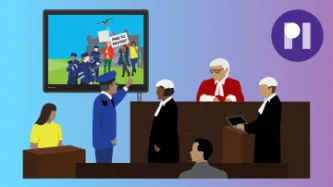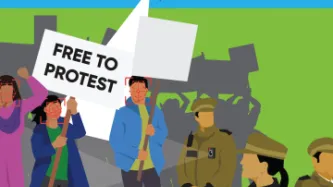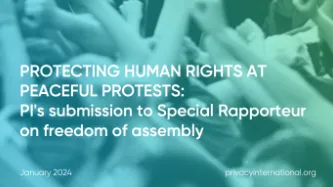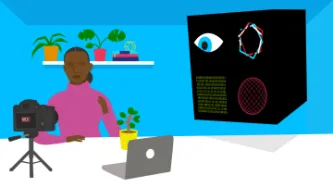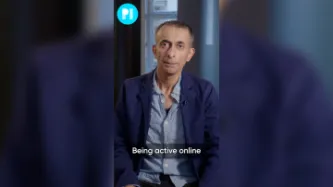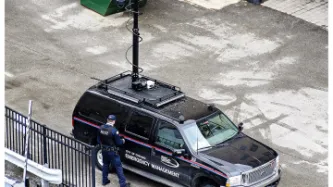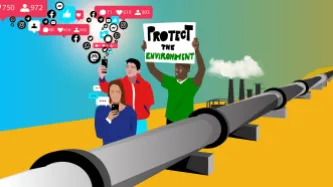Advanced Search
Content Type: Long Read
Intrusive surveillance technology is increasingly used during protests around the world, and we’ve been tracking its use around the world for years.This technology is often being deployed in secret, without a clear legal basis and without the safeguards and oversight applied to other surveillance technologies under international human rights law.We’ve increasingly observed the use of unlawfully generated and collected data from these technologies being used in court against people exercising…
Content Type: Report
The methodology employed for this report consists primarily of in-depth interviews held with grassroots political workers and representatives of collectives. The researchers interviewed 14 individuals from various social justice causes such as womens’ rights, climate change, transgender rights, students’ rights and the right to universal internet access in Pakistan. The experiences they have shared with the interviewers along with the real-time developments in the country’s law and order…
Content Type: Advocacy
Privacy International's response to the call of submissions of the UN Special Rapporteur on the rights to freedom of peaceful assembly and of association on the tools and guidelines which may assist law enforcement in promoting and protecting human rights in the context of peaceful protests. The Special Rapporteur's report will be presented at the 55th session of the UN Human Rights Council.While PI recognises the role of law enforcement can play in facilitating the enjoyment of freedom of…
Content Type: Explainer
The Free to Protest Guide Pakistan has been created by adapting Privacy International's (PI) Free to Protest Guide UK according to the laws and policies of Pakistan, in collaboration with PI and local activists in Pakistan.The Guide has been published in English, Urdu, Punjabi and Pashto.DISCLAIMER: This guide forms part of PI's global work to highlight the range of surveillance tools that law enforcement can use in the protest context, and how data protection laws can help guarantee…
Content Type: Long Read
The rise of the gig-economy, a way of working relying on short term contracts and temporary jobs rather than on an employed workforce, has enabled the growth of a number of companies over the last few years. But without the rights that comes with full employment, gig economy workers today don't have access to essential protections.
In 2021, PI worked with ACDU and Worker Info Exchange to shed a light on the power imbalance between workers and gig economy platforms, exposing how workers find…
Content Type: News & Analysis
We have been fighting for transparency and stronger regulation of the use of IMSI catchers by law enforcement in the UK since 2016. The UK police forces have been very secretive about the use of IMSI catchers – maintaining a strict “neither confirm nor deny” (NCND) policy. In our efforts to seek greater clarity we wrote to the UK body which monitors the use of covert investigatory powers, the Investigatory Powers Commissioner’s Office (IPCO), asking the Commissioner to revisit this…
Content Type: Explainer
What are the key factors you should consider when using a messaging app?
There are two main aspects to consider when deciding on the messaging app you want to use:
whether it offers end to end encryption that protects the content of your communication; and
whether it collects any information beyond the content of the message, such as location, who you communicate with and other details referred to as ‘metadata’.
Why is encrypted messaging important?
Encryption is the process of…
Content Type: Explainer
What protections might VPNs offer?
Adds an extra layer of encryption between your device and the VPN exit, hiding the content and metadata of your traffic, and true destination of your Internet browsing, from your internet service provider (ISP)
Hides your device’s IP address from websites & apps by routing your traffic via a third country, which can bypass country-based blocks
What don’t they offer?
Won’t hide your phone’s presence from IMSI catchers
Doesn’t protect against…
Content Type: Long Read
The defense and protection of the environment continues to come at a high cost for activists and human rights defenders. In 2021, the murders of environment and land defenders hit a record high. This year, a report by Global Witness found that more than 1,700 environmental activists have been murdered in the past decade.
While the issue of surveillance of human rights defenders has received attention, evidence of the surveillance of environmental activists keeps mounting, with recent examples…
Content Type: Examples
The Burkina Faso government cut off internet access across the country following protests demanding the resignation of president Roch Marc Christian Kabore. Insurgents have attacked military positions as well as gold-mining operations. A government statement said the outage was extended under a legal provision relating to national defence and public security.
https://www.bloomberg.com/news/articles/2021-11-25/burkina-faso-extends-internet-shutdown-before-nov-27-protests?sref=Hjm5biAW Internet…
Content Type: Examples
On January 5, 2022 the Kazakhstan government shut down the internet nationwide in response to widespread civil unrest after the government's removal of a price cap led liquid natural gas prices to rise sharply. Government use of a kill switch to block internet access is rising as a way of suppressing dissent and exercising social control; other examples include Iran, Sudan, Egypt, China, and Uganda. Kazakh law permits the government to temporarily suspend communications networks; much of the…
Content Type: Examples
On December 25, 2021, Sudanese security forces shot and killed four pro-democracy protesters and wounded hundreds of others who, among tens of thousands of people, defied a security lockdown and telecommunications network shutdowns to demonstrate against military rule, AFP News reports. Security forces installed new CCTV cameras on major thoroughfares in advance of the protests, which demanded a transition to a civilian government. Activists have also condemned sexual attacks on women and girls…
Content Type: Examples
Following a complaint from the Association for Civil Rights in Israel, the country's attorney general has said the Shin Bet security agency's use of mobile phone tracking technology to monitor and threaten Palestinian protesters at Jerusalem's Al Aqsa Mosque in May 2021 was a legitimate security tool, Josef Federman reports at ABC News. Shin Bet sent a text message to both Palestinian residents of east Jerusalem and Palestinian citizens of Israel who were determined to be in the area of the…
Content Type: Examples
Just as China uses technology system called "Integrated Joint Operations Platform" to control and surveil the persecuted population of Uighurs while restricting their movement and branding dissent as "terrorism", the Israeli military is using facial recognition and a massive database of personal information to control millions of Palestinians in the occupied West Bank. In November 2021, NSO Group's Pegasus spyware was found on the phones of six Palestinian human rights activists, three of whom…
Content Type: Examples
The Israeli minister of public security has joined police in denying claims in an article in Calcalist that the country's police force have used NSO Group's Pegasus software to spy on the phones of people who led protests against former premier Benjamin Netanyahu. Calcalist reported that the surveillance was carried out without court supervision or oversight of how the data was used. The daily Haaretz newspaper also reported that it had seen a 2013 invoice in which NSO billed police @@2.7…
Content Type: Examples
Ukraine and Russia are both weaponising facial recognition - but Russia is using it to hunt down anti-war protesters, holding and sometimes torturing anyone who refuses to be photographed, while Ukraine is using software donated by Clearview AI to help find Russian infiltrators at checkpoints, identify the dead and reunite families. Russia's widespread surveillance means that activists can be followed and arrested anywhere. In an approved, peaceful anti-government rally in Moscow in 2019,…
Content Type: Examples
Footage captured by Bloomberg shows that police are arresting anti-war protesters in Russia and scrolling through their phones.
https://www.bloomberg.com/news/videos/2022-03-07/russian-police-search-protesters-phones-make-arrests-video
Writer: Kommersant
Publication: Bloomberg TV
Publication date: 2022-03-07
Content Type: Examples
Based on a draft methodology from Russia's Emergency Situations Ministry, Kommersant business daily reports that Rostec's data subsidiary, Natsionalny Tsentr Informatizatsii, is developing software that will use machine learning to detect and prevent mass unrest. The software will analyse news reports, social media postings, public transport data, and video surveillance footage; if it fails to prevent mass unrest it is expected to direct the crowd's movements to stop it from escalating. The…
Content Type: Examples
The Kommersant reports that Russia's Rostec State Corporation is developing a new AI-powered anti-riot surveillance system that uses biometrics-powered cameras and can search social media networks and other publicly accessible data and intends to deploy the new system by the end of 2022. The behaviou analysis software is being developed as part of the Safe City project under the aegis of the Ministry of Emergency Situations, which intends to spend 97 billion rubles ($1.3 billion) deploying Safe…
Content Type: Examples
The energy company Cuadrilla used Facebook to surveil anti-fracking protesters in Blackpool and forwarded the gathered intelligence to Lancashire Police, which arrested more than 450 protesters at Cuadrilla's Preston New Road site over a period of three years in a policing operation that cost more than £12 million. Legal experts have called the relationship between fracking companies and the police "increasingly unhealthy" and called on the ICO and the Independent Office for Police Conduct to…
Content Type: Examples
Emails obtained by EFF show that the Los Angeles Police Department contacted Amazon Ring owners specifically asking for footage of protests against racist police violence that took place across the US in the summer of 2020. LAPD signed a formal partnership with Ring and its associated "Neighbors" app in May 2019. Requests for Ring footage typically include the name of the detective, a description of the incident under investigation, and a time period. If enough people in a neighbourhood…
